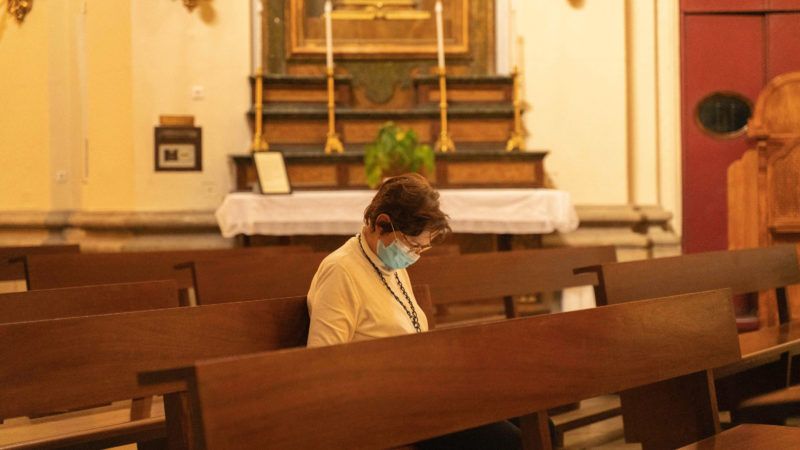Prohibiting Religious Services Makes the First Amendment a Coronavirus Victim
While governments are shutting down religious services and fining pastors who defy those orders.

A Massachusetts pastor, Kristopher Casey, will be punished with a $300 civil fine for convening more than 10 people at his Sunday church service. If he does it again, the fine will increase to $500, and he could face criminal charges, Masslive.com reports.
And where has the press been in the face of what seems, on its face, to be an egregious violation of the First Amendment's protections of peaceable assembly and the free exercise of religion? The newspapers have been basically cheering it on.
"The constitutional guarantee of civil liberties is not absolute, and its abridgment is not necessarily an act of tyranny," a Washington Post editorial advised. "In this pandemic, the reach of an individual's freedom to be foolish ends an inch away, where the next individual is entitled to protection against the peril posed by the fool's heedlessness." The Post insists that "the same rationale" that closed "concert halls, sports arenas, restaurants, and gyms," also "justifies and requires closing the doors to churches, synagogues, mosques, and other traditional venues of worship."
A New York Times editorial took a similar position: "Bans like these are legal, as long as they are neutral and applicable to everyone…. Under Supreme Court precedent, any infringement on speech or religion must be incidental to the central goal of the restriction, which in this case is clear: stopping the spread of the coronavirus."
If state, local, or federal authorities were shutting down newspaper printing plants, restricting reporters from newsgathering, or preventing the physical distribution of newspapers on pandemic-related public health grounds, the Times and the Post would almost certainly take a different, and less casual, view of the matter. They'd be in court complaining about First Amendment violations faster than you can say Floyd Abrams.
Back in September, the Times' publisher, A.G. Sulzberger, had a long article asserting that "a tour of our nation's history reminds that the role of the free press has been one of the few areas of enduring consensus," that "the First Amendment has served as the world's gold standard for free speech and the free press for two centuries. It has been one of the keys to an unprecedented flourishing of freedom and prosperity in this country and, through its example, around the world." Sulzberger insisted that "in the United States, the Constitution, the rule of law and a still-robust news media act as a constraint."
The same First Amendment and rule of law that protects the free press is the one that protects the freedom of assembly and the free exercise of religion. For that self-interested reason alone, you'd think that maybe the newspapers would be less eager about cheering on the abridgment of civil liberties.
A few brave journalists have taken a different view of it. Veteran economic columnist David Warsh is critical of what he describes as "news media that pass along orders without questions." An editorial in the New Boston Post observes disapprovingly that "all this is happening in the state where people prized their liberty enough to start the American War for Independence."
Pastor Casey of the Adams Square Baptist Church in Worcester, in his April 22 letter to Governor Baker of Massachusetts and to the mayor and police chief of Worcester, quoted the Massachusetts Constitution of 1780, which is older even than the federal First Amendment: "It is the right as well as the duty of all men in society, publicly, and at stated seasons to worship the Supreme Being, the great Creator and Preserver of the universe. And no subject shall be hurt, molested, or restrained, in his person, liberty, or estate, for worshipping God in the manner and season most agreeable to the dictates of his own conscience; or for his religious profession or sentiments; provided he doth not disturb the public peace, or obstruct others in their religious worship."
The federal Constitution does expressly provide that some rights are limited in extraordinary circumstances. The suspension clause in Article I, for example, provides that the privilege of the writ of habeas corpus can be suspended "when in Cases of Rebellion or Invasion the public Safety may require it." But there's no such language about suspending the First Amendment. And even the habeas corpus language applies only specifically to cases of "rebellion or invasion," not as a blanket "public safety" concern. Whether the novel coronavirus qualifies as an "invasion" may yet be a matter for litigation.
In the meantime, leaving aside the legal questions, as a practical and political matter it seems highly unlikely that Americans will stand idly by indefinitely while the government forbids them from gathering in their places of worship. The newspaper editorial writers may roll over for it, but Pastor Casey and his congregants, and many others like them, will not.


Show Comments (93)